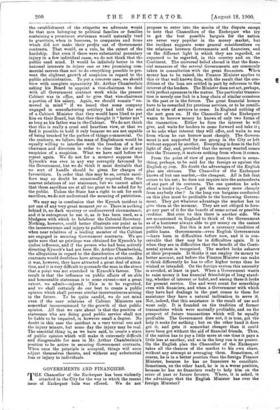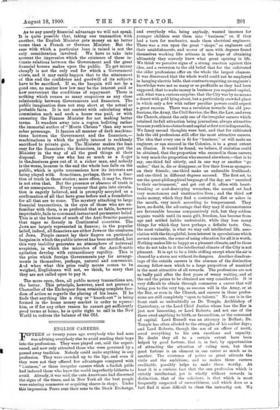GOVERNMENTS AND FINANCIERS.
91HE Chancellor of the Exchequer has been violently A. attacked in the City for the way in which the recent issue of Exchequer bills was offered.. We do not propose to enter into the merits of the dispute except to note that Chancellors of the Exchequer who try to get the best possible bargain for the nation are . never very popular in the money .market, but the incident suggests some general considerations on the relations between Governments and financiers; and on the different light in which they are regarded, or supposed to be regarded, in this country and on the Continent. The universal belief abroad is that the finan- cial measures of the several Governments are commonly taken in consultation with the great financiers. When money has to be raised, the Finance Minister applies to, this or that well-known firm, with the result that the con-. ditions of the loan are settled in part by reference to the interest of the lenders. The Minister does not act, perhaps, with perfect openness in the matter. The particular transac- tion is merely one link in a long chain of similar occasions in the past or in the future. The great financial houses have to be rewarded for previous services, or to be concili- ated in view of services to come. In England nothing of the sort goes on. If the Chancellor of the Exchequer. wants to borrow money he knows of. only two forms of the transaction. Either he fixes the interest he will give, and waits for lenders to come forward and take it ; or be asks what interest they will offer, and waits to see from whom he can borrow most cheaply. The Govern- ment is not supported by one group in the City or left without support by another. Everything is done in the full light of day, and, provided that the money wanted comes into the Treasury, it matters nothing from whom it comes.
From the point of view of pure finance there is some- thing, perhaps, to be said for the foreign as against the English sy.,tem. No doubt the advantages of the English plan are obvious. The Chancellor of the Exchequer knows of but one market,—the cheapest. All is fish that comes to his net ; he does not inquire into the antecedents: of any part of its contents. The one question he asks- about a lender is,—Can I get the money more cheaply from anybody else ? In the long run bargains conducted- on this plan must be profitable to the borrowing Govern- ment. They get whatever advantage the market has to give them at the moment. They are not obliged to fore- go any part of it for the benefit of some actual or possible creditor. But even to this there is another side. We are accustomed in England to think of the Government as of a borrower always able to get money on the easiest possible terms. But this is not a necessary condition of- public loans. Governments—even English Governments —have been in difficulties before now, and it is con- ceivable that they may be in difficulties again. It is when they are in difficulties that the benefit of the Conti- nental system is recognised. The market looks askance at their proposals. It thinks it can employ its money to better account, and before the Finance Minister can make it think differently he has to offer higher terms than he wished or intended. On the foreign system this necessity is avoided, at-least in part. When a Government wants to raise money it has financial friendships of long stand- ing, whether of interest or habit, and among these it looks for present service. Use and wont count for something even with financiers, and when a Government with which they have had dealings in the past comes to them for assistance they have a natural inclination to serve it. Not, indeed, that this assistance is the result of use and wont only. It is founded on the tradition of former transactions which were mutually profitable, and on the prospect of future transactions which will be equally profitable. The Government does not, it is true, get the help it seeks for nothing ; but on the other hand it does get it, and gets it somewhat cheaper than it could have been got without the aid. of financial friends. Thus, if the nation has to pay a little more at one time it pays a little less at another, and so in the long run is no poorer. On the English plan the Chancellor of the Exchequer takes all the chances of the market to his own share. without any attempt at averaging them. Sometimes, of. course, he is in a better position than the foreign Finance Minister, because he has no financiers to conciliate. Sometimes, on the other hand, he is in a worse position, because he has no financiers ready to help him on the score of past or future favours. Where, it is asked, is the advantage that the English Minister has over the foreign Minister? As to any purely financial advantage we will not speak. It is quite possible that, taking one transaction with another, the English Minister gets money on no better terms than a French or German Minister. But the ease with which a particular loan is raised is not the only consideration involved. We have to take into account the impression which the existence of these in- timate relations between the Government and the great financial houses makes upon the public. To get money cheapty is not the only end for which a Government exists, and it may easily happen that to the attainment of this end the confidence and goodwill of its subjects have to be sacrificed. If so, the bargain will not be a good one, no matter how low may be the interest paid or how convenient the conditions of repayment. There is nothing which rouses so many suspicions as any close relationship between Governments and financiers. The public imagination does not stop short at the actual or probable facts. It is not content with calculating what commission such and such a house was paid, or with censuring the Finance Minister for not making better terms. It wanders away into a region befitting rather the immortal author of " Monte Christo " than any more sober personage. It fancies all manner of dark machina- tions between the Government and the financiers,— machinations in which the public interest is recklessly sacrificed to private gain. The Minister makes the loan easy for the financiers ; the financiers, in return, put the Minister in the way of all the good things at their disposal. Every one who has so much as a finger in theibusittess goes out of it a richer man, and nobody is the worse, because in the end the whole loss falls on the public, which is quite unconscious how its interests are being played with. Sometimes, perhaps, there is a frac- tion of truth in these stories; more often, it may be, there is not even that. But the presence or absence of truth is of no consequence. Every rumour that gets into circula- tion is eagerly believed, and is promptly accepted as a confirmation of all that have gone before and a foundation for all that are to come. The mystery attaching to large financial transactions, in the eyes of those who are un- familiar with them, is so profound that no fable, however im probable, fails to command instantand permanent belief. This is at the bottom of much of the Anti-Semitic passion that rages so fiercely in Continental countries. The Jews are largely represented in finance; in the popular belief, indeed, all financiers are either Jews or the creatures of Jews. People cannot lay their fingers on particular bargains in which the public interest has been sacrificed, but this very inability generates an atmosphere of universal suspicion, in which the microbes of the Anti-Semitic agitation develop with extraordinary rapidity. This is the price which foreign Governments pay for arrange- ments in themselves, perhaps, natural and convenient. And when what this price really means comes to be weighed, Englishmen will not, we think, be sorry that they are not called upon to pay it.
The more open, then, all public money transactions are, the better. This principle, however, need not prevent a Chancellor of the Exchequer from retaining complete free- dom of action as regards the placing of his loans. If he finds that anything like a ring or " knock-out " is being formed in the home money market in order to squeeze him, or if for any other reason he cannot get sufficiently good terms at home, he is quite right to call in the New World to redress the balance of the Old.



































 Previous page
Previous page